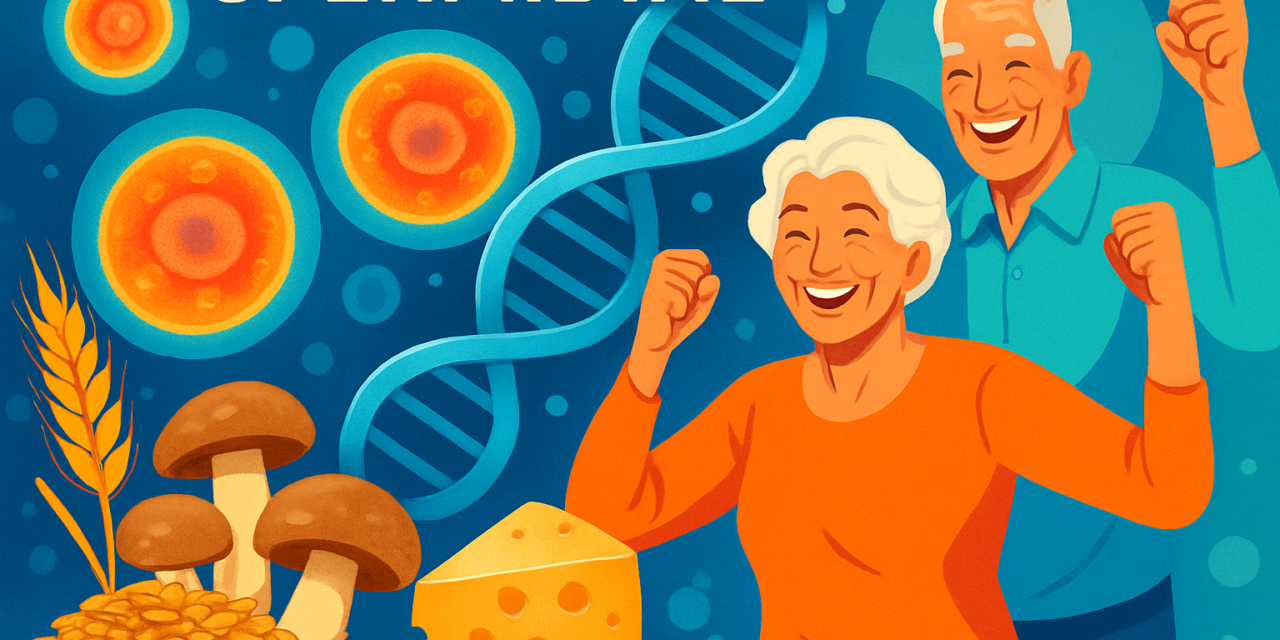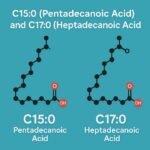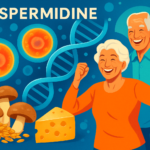Introduction to Spermidine
What is Spermidine?
Spermidine is a naturally occurring polyamine compound that exists in all living cells. It plays a crucial role in cellular growth, repair, and renewal. Despite its unusual name, spermidine isn’t something to shy away from—it’s an essential molecule that has captured the attention of scientists for its potential in promoting longevity, improving health, and preventing age-related decline. Found in foods like wheat germ, soybeans, mushrooms, and aged cheese, spermidine works at the cellular level, supporting vital functions that keep our bodies youthful and resilient.
Unlike many synthetic supplements that try to mimic natural processes, spermidine is inherently produced in the body. However, as we age, our natural levels of spermidine decline, leading researchers to investigate whether boosting it through diet or supplementation could help counteract aging. The fascination with spermidine is growing, not just among scientists, but also among people who want to live healthier and longer lives.
Historical Background and Discovery
The discovery of spermidine dates back to the 17th century when scientists first identified it in semen, which is where it gets its name. Over time, further studies revealed that spermidine is not confined to reproductive cells but is actually present in every part of the human body, from our blood to our organs. Initially, it was considered just another organic compound with limited significance, but breakthroughs in cellular biology have since redefined spermidine as a powerhouse molecule essential for life.
The true spotlight on spermidine came when researchers began studying its link to autophagy, a process where cells “clean up” damaged components. This groundbreaking discovery shifted spermidine from a scientific curiosity to a compound with immense therapeutic potential. Today, the focus is on understanding how spermidine can be harnessed for preventing disease, slowing down aging, and supporting human health.
Why Spermidine is Gaining Attention in Health Research
Over the past decade, spermidine has become one of the most talked-about compounds in longevity science. The reason is simple: it activates processes in the body that mimic the effects of fasting and caloric restriction—two practices long associated with extended lifespan and better health. Unlike restrictive diets, spermidine offers a more approachable way to achieve similar benefits without completely altering lifestyle.
Research is uncovering that spermidine has a hand in reducing inflammation, improving heart health, protecting brain function, and even delaying visible signs of aging. While the idea of a single compound being capable of such widespread benefits might sound too good to be true, the mounting evidence is compelling enough that major universities and research centers are investing heavily in spermidine studies. This surge in scientific curiosity has also driven the supplement industry to bring spermidine capsules and powders to the market, making it more accessible to everyday people.
The Science Behind Spermidine
How Spermidine Works in the Body
At the most basic level, spermidine helps regulate cell growth, replication, and survival. It stabilizes DNA, supports protein synthesis, and protects cells from oxidative stress. One of its most fascinating roles is in promoting cell renewal through autophagy—a process where old, damaged cellular parts are broken down and recycled into new components. Without autophagy, cells accumulate waste, leading to aging and disease.
Spermidine essentially acts as a switch, turning on the body’s natural ability to “declutter” itself. Think of it as spring cleaning for your cells: broken parts are removed, energy efficiency is restored, and new structures are built. This ensures that your organs and tissues function optimally for longer, delaying age-related decline.
Beyond autophagy, spermidine also interacts with key cellular pathways that influence inflammation, metabolism, and mitochondrial health. Mitochondria, often called the “powerhouses of the cell,” thrive when supported by spermidine, ensuring better energy production and lower risk of age-associated dysfunction.
Spermidine and the Role of Autophagy
Autophagy is one of the hottest topics in longevity research, and spermidine sits right at the center of it. This self-cleaning process prevents cells from becoming overwhelmed by damaged proteins and organelles. If left unchecked, this cellular “junk” can lead to chronic diseases like Alzheimer’s, Parkinson’s, and cardiovascular conditions. Spermidine stimulates autophagy naturally, making it one of the most promising anti-aging compounds available.
The beauty of spermidine-induced autophagy is that it provides similar benefits to fasting—such as improved metabolism, reduced inflammation, and extended lifespan—without requiring extreme lifestyle changes. Scientists often compare spermidine to caloric restriction mimetics, compounds that trick the body into thinking it’s fasting, thereby unlocking longevity pathways without the discomfort of prolonged fasting.
Effects on Mitochondrial Health and Cellular Function
Mitochondria are critical for producing energy, and when they deteriorate, the entire body feels the effects—fatigue, slower metabolism, and age-related illnesses. Spermidine supports mitochondrial biogenesis, the process of creating new mitochondria. By maintaining a healthy population of mitochondria, spermidine ensures cells stay energized and resilient against stress.
Moreover, spermidine influences gene expression by stabilizing DNA structures and regulating epigenetic mechanisms. This means it doesn’t just help cells survive in the short term but also improves how they function over the long haul. In essence, spermidine gives cells the tools they need to age gracefully.
Health Benefits of Spermidine
Spermidine and Longevity: Can It Extend Lifespan?
One of the biggest claims surrounding spermidine is its potential to extend lifespan. Animal studies have shown promising results, with mice and yeast experiencing significantly longer lifespans when given spermidine. While human studies are still emerging, observational research suggests people with higher dietary spermidine intake live longer and healthier lives.
Spermidine’s impact on longevity comes from its ability to reduce cellular damage, support autophagy, and enhance metabolic efficiency. These processes slow down biological aging, allowing the body to stay younger for longer. Scientists believe that spermidine could eventually become a cornerstone in longevity medicine, much like resveratrol or NAD+ boosters.
However, it’s important to note that spermidine isn’t a magic bullet. It works best when combined with other healthy lifestyle choices such as balanced nutrition, exercise, and stress management. The idea is not to rely solely on a supplement but to view spermidine as an additional tool in the broader pursuit of healthy aging.
Brain Health and Cognitive Function
Spermidine is rapidly gaining recognition for its potential role in preserving brain health. As we age, the risk of cognitive decline, memory loss, and neurodegenerative diseases like Alzheimer’s increases significantly. One of the primary reasons for this decline is the buildup of toxic proteins and damaged cell components in brain cells. Spermidine, through its ability to stimulate autophagy, helps clear out these harmful accumulations, allowing neurons to function more efficiently. Think of it as a housekeeping service for your brain, ensuring that mental performance remains sharp well into old age.
Recent studies highlight that individuals with higher spermidine intake tend to perform better in memory and learning tasks. This has opened the door to clinical trials testing spermidine supplements in patients with mild cognitive impairment. Early findings suggest that spermidine may help slow down the progression of dementia by maintaining brain plasticity and protecting synaptic connections—the communication hubs between brain cells.
Beyond disease prevention, spermidine also contributes to everyday brain function. People who consume spermidine-rich foods often report better focus, mental clarity, and overall mood stability. Considering the rising prevalence of mental fatigue in today’s fast-paced world, this makes spermidine a valuable nutrient not just for the elderly but also for younger adults looking to stay mentally resilient. The potential here is huge: instead of only treating cognitive decline once it sets in, spermidine may allow us to preserve mental sharpness as a proactive measure.
Spermidine’s Role in Cardiovascular Health
Heart disease remains one of the leading causes of death globally, and scientists are continuously exploring natural compounds that can support cardiovascular wellness. Spermidine has emerged as a promising candidate, thanks to its ability to protect blood vessels, regulate blood pressure, and reduce oxidative stress—all of which are vital for heart health.
One fascinating aspect is spermidine’s link to improved arterial elasticity. As we age, arteries tend to stiffen, leading to hypertension and increased risk of stroke or heart attack. By stimulating autophagy, spermidine helps maintain the flexibility of blood vessels, ensuring smoother blood flow and lower strain on the heart. Several long-term studies suggest that people with higher dietary spermidine intake have a lower risk of cardiovascular events and increased overall survival.
Additionally, spermidine appears to reduce cholesterol buildup and inflammation in arteries, both of which are central factors in heart disease. This dual effect makes spermidine stand out compared to other heart-health supplements. Instead of merely addressing symptoms, it tackles root causes at the cellular level.
While spermidine supplementation is not a replacement for exercise, a balanced diet, or medical treatment, it certainly complements them. Imagine pairing spermidine with heart-healthy habits like regular movement, a Mediterranean-style diet, and stress management—the combination could be a game-changer for long-term cardiovascular health.
Anti-Inflammatory and Anti-Aging Properties
Inflammation is often called the “silent killer” because it quietly contributes to many chronic diseases, from arthritis to diabetes and even cancer. Chronic low-grade inflammation, also known as “inflammaging,” is one of the main drivers of biological aging. This is where spermidine truly shines—it doesn’t just fight inflammation; it helps prevent it at its source.
By activating autophagy, spermidine ensures that cells efficiently remove damaged proteins and organelles, which are often the trigger for inflammatory responses. When cells function smoothly, the immune system doesn’t go into overdrive, resulting in lower inflammation across the body. This process reduces the risk of degenerative conditions while also supporting a more youthful appearance and energy level.
What’s particularly exciting is spermidine’s synergy with other longevity practices. For instance, intermittent fasting is known to lower inflammation, but adding spermidine may enhance those effects even further. In terms of anti-aging, spermidine contributes to healthier skin, improved joint flexibility, and higher energy metabolism. People often describe feeling “lighter” or more energetic when regularly consuming spermidine-rich foods or supplements—likely because their cells are functioning more efficiently.
In many ways, spermidine acts as a reset button for the body’s inflammatory systems, creating an internal environment that supports long-term vitality. Instead of battling inflammation after it takes hold, spermidine promotes a proactive defense mechanism that keeps aging at bay.
Natural Sources of Spermidine
Foods Rich in Spermidine
Unlike some longevity compounds that are difficult to obtain naturally, spermidine is abundant in a variety of everyday foods. Some of the richest dietary sources include:
- Wheat germ – One of the most concentrated natural sources of spermidine.
- Soy products – Soybeans, natto, and tofu provide excellent amounts.
- Mushrooms – Especially shiitake and maitake mushrooms.
- Aged cheeses – Particularly cheddar and blue cheese.
- Legumes and pulses – Lentils, chickpeas, and green peas.
- Whole grains – Brown rice, oats, and corn.
- Vegetables – Broccoli, cauliflower, and green leafy vegetables.
Incorporating these foods into your daily diet can provide a steady supply of spermidine without the need for supplementation. For example, starting the day with a bowl of oats topped with soy milk and mushrooms at dinner could easily boost spermidine levels naturally.
What’s even more encouraging is that these spermidine-rich foods are also packed with other beneficial nutrients such as fiber, protein, and antioxidants, which work synergistically to support overall health. This means that by eating a spermidine-friendly diet, you’re not only targeting longevity but also improving digestive health, immunity, and energy levels.
Dietary Patterns That Support Spermidine Intake
Rather than focusing solely on individual foods, it’s helpful to look at broader dietary patterns. The Mediterranean diet, for instance, naturally incorporates many spermidine-rich foods such as legumes, whole grains, and vegetables. Similarly, plant-based diets tend to provide higher levels of spermidine because they emphasize beans, soy, and grains—all primary sources of this compound.
Cultural eating habits also influence spermidine intake. For example, populations that consume traditional soy-based dishes in Asia or fermented cheese in Europe often have higher baseline spermidine levels compared to those following a typical Western diet heavy in processed foods. This dietary difference may partly explain why some regions experience longer life expectancy and lower rates of chronic diseases.
To maximize spermidine intake through diet, consider adopting eating patterns that emphasize minimally processed, plant-rich foods. Regularly rotating legumes, mushrooms, and whole grains into meals can help maintain consistent levels of spermidine.
How Cooking and Food Processing Affect Spermidine Levels
One important but often overlooked aspect of spermidine intake is how food preparation impacts its concentration. While spermidine is naturally present in many foods, its levels can change depending on how those foods are cooked or processed. For instance, boiling vegetables may cause some spermidine to leach into the cooking water, while steaming tends to preserve more of it. Similarly, whole grains retain more spermidine than refined grains because most of the compound is found in the bran and germ, which are often stripped away during processing.
Fermentation is another factor that can significantly influence spermidine levels. Foods like aged cheese and natto (fermented soybeans) contain much higher concentrations compared to their non-fermented counterparts. This is because the fermentation process allows beneficial bacteria to produce additional polyamines, effectively enriching the food with spermidine. That’s one reason why traditional diets that rely on fermented foods often provide higher levels of this longevity-boosting compound.
Storage also matters. Fresh produce tends to lose spermidine content the longer it sits before consumption. Therefore, eating freshly harvested fruits and vegetables, or at least minimizing long storage times, can help maximize spermidine intake. If you’re looking to get the most out of your diet, focusing on fresh, minimally processed, and fermented foods is one of the best strategies to optimize natural spermidine levels.
Spermidine Supplements
Types of Spermidine Supplements Available
As interest in spermidine has surged, the supplement industry has introduced various forms to meet demand. The most common types include:
- Spermidine-rich wheat germ extract – One of the most popular sources, standardized for spermidine content.
- Synthetic spermidine – Laboratory-produced, designed for consistency and purity.
- Blended supplements – Combined with other longevity compounds such as resveratrol, NMN, or quercetin to provide a synergistic effect.
Each type comes with its own benefits. Natural extracts often appeal to people who prefer plant-based options, while synthetic spermidine allows for precise dosing. Blended formulas, on the other hand, aim to maximize overall longevity pathways by targeting multiple cellular functions at once.
It’s worth noting that not all supplements are created equal. Some may contain only trace amounts of spermidine, making them less effective. Reputable brands typically provide clear labeling on spermidine concentration and source, helping consumers make more informed choices.
Dosage and Safety Considerations
Determining the right dosage of spermidine can be tricky since human studies are still relatively limited. Most clinical trials have used daily doses ranging from 1 to 10 milligrams, often depending on the form of spermidine being tested. While natural dietary intake provides a baseline amount, supplementation may help boost levels to those associated with improved health outcomes in research.
Safety-wise, spermidine is generally well-tolerated, especially when derived from food sources. However, with supplements, it’s always best to start with lower doses and gradually increase as needed. People with pre-existing medical conditions, especially those on prescription medications, should consult a healthcare provider before starting supplementation. This is particularly important because spermidine influences cellular processes that could interact with certain therapies.
Unlike many synthetic compounds, spermidine supplementation has shown few adverse effects in trials so far. The biggest concern lies in unregulated products with inconsistent quality. Choosing third-party tested supplements from trusted brands is the best way to minimize risks.
Comparing Natural vs. Supplemental Sources
A common question is whether it’s better to rely on spermidine from diet or supplements. The answer depends largely on lifestyle and dietary habits. People who eat a diet rich in whole grains, legumes, mushrooms, and fermented foods may already meet optimal spermidine levels without needing supplements. In fact, getting spermidine from food provides additional health benefits, since these foods also supply fiber, vitamins, and minerals.
However, for individuals who struggle to maintain a spermidine-rich diet—whether due to dietary restrictions, convenience, or personal preference—supplements offer a practical alternative. They provide a reliable and measurable way to ensure adequate intake. In many cases, a combination of both dietary sources and supplementation may be the most effective approach.
Ultimately, food-first strategies are always ideal, but supplements can act as a safety net, especially for those targeting specific health outcomes such as cognitive protection or longevity support.
Spermidine and Disease Prevention
Spermidine in Cancer Research
Cancer remains one of the most feared diseases worldwide, and scientists are eager to explore natural compounds that may reduce risk or improve treatment outcomes. Spermidine has shown promise in this area due to its unique role in regulating cell growth and autophagy. By helping cells eliminate damaged or malfunctioning components, spermidine reduces the likelihood of abnormal cell development—a key factor in cancer formation.
Several laboratory studies have found that spermidine can suppress tumor growth by promoting programmed cell death in cancerous cells. It also seems to enhance the effectiveness of chemotherapy drugs, making them more potent at targeting malignant cells. What makes spermidine particularly interesting is that it appears to protect healthy cells at the same time, reducing the collateral damage often associated with cancer therapies.
While the research is still in its early stages, the potential is undeniable. Future clinical trials may determine whether spermidine could be integrated into cancer prevention strategies or even as a complementary therapy alongside traditional treatments. Until then, maintaining a spermidine-rich diet remains a safe and proactive way to support overall cellular health and resilience.
Spermidine’s Role in Metabolic Disorders
Metabolic disorders such as obesity, type 2 diabetes, and insulin resistance are major global health concerns. Spermidine has drawn attention for its ability to regulate metabolism at a cellular level. Studies suggest that spermidine improves insulin sensitivity, enhances fat metabolism, and reduces the risk of metabolic dysfunctions.
One of spermidine’s key effects is improving mitochondrial efficiency, which allows cells to burn energy more effectively. This not only supports weight management but also lowers the risk of fat accumulation in vital organs such as the liver. Additionally, by reducing oxidative stress and inflammation—two hallmarks of metabolic syndrome—spermidine helps the body maintain a more balanced internal environment.
In real-world terms, this means spermidine could help people struggling with blood sugar spikes, energy crashes, or weight fluctuations. While it’s not a replacement for lifestyle changes like exercise and diet modifications, it acts as a supportive compound that enhances the benefits of those healthy habits. The integration of spermidine into metabolic health protocols is a promising area of ongoing research.
Protection Against Neurodegenerative Diseases
One of spermidine’s most exciting areas of study is its potential to protect against neurodegenerative diseases such as Alzheimer’s, Parkinson’s, and Huntington’s disease. These conditions are largely driven by the accumulation of toxic proteins and the breakdown of neuronal health—exactly the issues that spermidine’s autophagy-boosting effects address.
Research has shown that spermidine can help neurons clear out harmful protein clumps, preserving synaptic connections and cognitive function. In animal models, spermidine supplementation has improved memory, motor skills, and learning capacity. Human trials are ongoing, but early indications suggest that spermidine could delay or even prevent the onset of cognitive decline when taken consistently over time.
Beyond prevention, spermidine may also provide therapeutic benefits for those already diagnosed with neurodegenerative conditions. By maintaining cellular integrity and reducing inflammation in the brain, spermidine helps slow disease progression and improve quality of life. While more research is needed, the hope is that spermidine could become part of a comprehensive brain health strategy in the near future.
Spermidine and Skin Health
Anti-Aging Effects on Skin
The skin is often the first place where signs of aging become visible—wrinkles, fine lines, dryness, and loss of elasticity. Spermidine has emerged as a powerful ally in promoting youthful-looking skin thanks to its role in cellular renewal. By stimulating autophagy, spermidine helps skin cells regenerate more efficiently, clearing away damaged proteins and encouraging the production of new, healthy cells. This process results in firmer, more resilient skin that shows fewer signs of aging.
Studies suggest that spermidine can reduce oxidative stress in skin cells, one of the main culprits behind premature aging. Free radicals from sun exposure, pollution, and lifestyle factors accelerate damage to collagen and elastin—the proteins responsible for skin strength and elasticity. By neutralizing these effects, spermidine helps maintain smoother skin texture and a natural glow.
Moreover, spermidine supports hydration levels by influencing the skin barrier. A stronger barrier means less water loss and better defense against environmental stressors, leaving the skin looking plumper and more youthful. Unlike many topical products that only address the skin’s surface, spermidine works from within, improving cellular health at a deeper level.
Collagen Production and Skin Elasticity
Collagen is often called the “scaffolding” of the skin—it keeps everything firm, tight, and lifted. As we age, collagen production naturally declines, leading to sagging and wrinkles. Spermidine, however, appears to slow this decline by promoting collagen synthesis and protecting existing collagen fibers from breakdown.
One way spermidine achieves this is by reducing the activity of enzymes that degrade collagen. At the same time, it boosts fibroblast activity—the skin cells responsible for generating new collagen. This dual action ensures not only the preservation of current skin structure but also the continuous renewal of supportive tissues.
People who consistently consume spermidine-rich diets or supplements may notice improved skin elasticity, fewer fine lines, and an overall healthier complexion. Some skincare companies have even begun exploring spermidine as an ingredient in anti-aging creams and serums, aiming to combine internal and external benefits for maximum effect.
Spermidine in Cosmetic Applications
The beauty industry is always on the hunt for breakthrough ingredients that actually deliver results, and spermidine is quickly becoming a star. Beyond dietary intake, topical applications of spermidine are being researched for their ability to rejuvenate skin directly. Early findings suggest that applying spermidine-infused creams may help accelerate wound healing, reduce scarring, and improve overall skin tone.
Cosmetic companies are particularly interested in spermidine’s ability to mimic the effects of fasting at a cellular level. Since fasting has long been linked to rejuvenation, spermidine provides a way to achieve similar results without extreme lifestyle changes. Imagine a skincare product that helps your skin cells “detox” themselves daily—this is the potential spermidine brings to the table.
While research is still in its infancy, the integration of spermidine into the cosmetic world may revolutionize how we approach anti-aging treatments. In the near future, we might see spermidine-based skincare products alongside more familiar ingredients like hyaluronic acid and retinol, offering a new dimension to beauty and wellness routines.
Lifestyle and Spermidine
How Exercise Influences Spermidine Levels
Exercise is often described as one of the most powerful tools for longevity, and interestingly, it has a close relationship with spermidine. Physical activity naturally boosts spermidine levels in the body, creating a feedback loop where spermidine further enhances the benefits of exercise. This synergy helps explain why active individuals often enjoy better metabolic health, improved brain function, and slower aging.
When we exercise, cells undergo mild stress that encourages them to adapt and become stronger. Spermidine supports this adaptation by activating autophagy, ensuring that damaged cellular components are cleared away and replaced with healthier ones. This process not only accelerates recovery after workouts but also enhances long-term resilience of tissues, including muscles, joints, and the cardiovascular system.
For those who want to maximize both longevity and fitness, combining regular exercise with a spermidine-rich diet or supplementation may provide compounded benefits. Whether it’s resistance training, cardio, or even yoga, the body’s natural response to movement pairs perfectly with the cellular renewal processes driven by spermidine.
Fasting, Caloric Restriction, and Spermidine
For decades, scientists have known that caloric restriction and intermittent fasting can extend lifespan and improve health markers. Spermidine has been described as a “fasting mimetic” because it activates many of the same cellular pathways triggered by fasting—particularly autophagy. This means spermidine can help people achieve some of the benefits of fasting without drastically reducing food intake.
Of course, this doesn’t mean spermidine is a complete substitute for fasting. However, it does offer an additional layer of support for those practicing intermittent fasting or time-restricted eating. By combining both strategies, you may amplify the effects on longevity, metabolism, and inflammation control.
For individuals unable to fast due to health conditions or personal preference, spermidine provides a practical alternative. Including spermidine-rich foods in meals can simulate some of the beneficial effects of fasting, making it an accessible tool for a wider population.
Building a Longevity Lifestyle Around Spermidine
Longevity isn’t about one single habit—it’s about a holistic lifestyle. Spermidine fits seamlessly into this bigger picture. Along with exercise, proper sleep, stress management, and a nutrient-rich diet, spermidine becomes a cornerstone of a well-rounded longevity plan.
A practical approach might look like this:
- Morning: Start the day with whole-grain oats topped with nuts and soy milk.
- Lunch: Include lentils, mushrooms, or chickpeas in your meal.
- Dinner: Add a serving of broccoli or cauliflower, with a side of aged cheese in moderation.
- Daily habits: Stay physically active, practice stress reduction techniques, and consider spermidine supplements if dietary intake is low.
By weaving spermidine into everyday routines, you’re not just targeting one area of health—you’re strengthening the entire foundation of long-term wellness. It’s about creating an environment where your body and mind can thrive for decades to come.
Potential Risks and Side Effects
Who Should Avoid Spermidine?
Although spermidine is generally safe, it may not be suitable for everyone. Pregnant or breastfeeding women, for example, should avoid supplements until more research clarifies their safety. Similarly, people with certain medical conditions such as cancer undergoing active treatment should consult with their doctors before taking spermidine, since its effects on rapidly dividing cells could be complex.
Children and young adults typically produce adequate amounts of spermidine naturally, so supplementation may not be necessary. Instead, focusing on a balanced diet is usually sufficient. Older adults or individuals with chronic health conditions, however, may benefit the most from increased spermidine intake.
In general, anyone considering spermidine supplements should seek medical guidance, especially if they are taking medications or undergoing treatment for long-term health conditions.
Possible Interactions with Medications
Like any bioactive compound, spermidine may interact with certain medications. Because it influences cell growth, metabolism, and autophagy, people taking drugs that target similar pathways should exercise caution. For instance, some chemotherapy drugs work by disrupting cell division, while spermidine promotes cellular health and renewal—this could potentially interfere with treatment outcomes if not carefully managed.
Another area of concern is blood pressure medications. Spermidine has been shown to naturally lower blood pressure by improving arterial elasticity. While this is beneficial for most people, it could enhance the effects of antihypertensive drugs, leading to excessive blood pressure reduction. Those already on such medications should closely monitor their blood pressure if introducing spermidine supplements.
Additionally, spermidine may affect blood sugar regulation. People taking insulin or diabetes medications should be cautious, as combining both could lead to hypoglycemia. These potential interactions don’t mean spermidine is unsafe, but they highlight the importance of consulting a healthcare professional before beginning supplementation—especially for individuals with chronic health conditions or those on prescription medication.
Long-Term Use and Safety Concerns
The big question surrounding spermidine is: what happens when you take it for years or even decades? So far, the evidence suggests that spermidine is safe and beneficial for long-term use. Populations with naturally high spermidine intake from diet tend to enjoy longer lifespans and lower rates of chronic disease, which is an encouraging sign.
Clinical studies using spermidine supplements have also reported minimal side effects, typically limited to mild digestive discomfort in some individuals. However, because research on supplementation is still relatively young, scientists urge caution until more long-term human data is available.
One concern is that boosting spermidine levels excessively might have unintended effects on cancerous cells, since spermidine supports cellular growth. While current research leans toward spermidine being protective against cancer, more data is needed to rule out risks in certain populations.
Overall, the consensus is that moderate supplementation combined with a spermidine-rich diet is a safe and effective strategy for most people. Monitoring dosage, sticking to reputable brands, and pairing it with a healthy lifestyle help minimize potential risks.
Future of Spermidine Research
Ongoing Clinical Trials and Studies
The scientific community is investing heavily in spermidine research, with numerous clinical trials underway across the globe. These studies aim to clarify its effects on aging, brain health, cardiovascular function, and metabolic health in humans. For example, European research teams are testing spermidine supplements in older adults to evaluate their impact on memory performance and cognitive resilience.
Other studies are investigating spermidine’s role in preventing heart disease, with early data suggesting significant reductions in blood pressure and improved arterial health. There’s also strong interest in its potential use in cancer prevention and treatment support. These trials will provide valuable insights into the optimal dosages, long-term safety, and specific health outcomes associated with spermidine supplementation.
Potential Pharmaceutical Applications
If ongoing trials confirm spermidine’s wide-ranging health benefits, pharmaceutical companies may begin developing spermidine-based drugs tailored to specific conditions. For example, a spermidine-derived medication could be created for Alzheimer’s patients to slow down disease progression, or for individuals at high risk of cardiovascular disease to maintain arterial health.
Pharmaceutical applications could also involve combining spermidine with other compounds to maximize its effects. For instance, pairing spermidine with NAD+ boosters or resveratrol may create a multi-targeted approach to longevity, tackling aging from several biological angles at once.
The challenge lies in ensuring that such pharmaceutical products maintain spermidine’s natural balance without causing over-stimulation of cellular growth, which could present risks. This is why precise dosing and delivery methods will be critical in future developments.
Predictions for the Future of Longevity Science
Spermidine is not just a passing trend—it represents a major step forward in our understanding of how diet and natural compounds influence aging. As the science matures, we may see spermidine become as widely recognized as vitamins and minerals, included not only in supplements but also in functional foods and fortified products.
In the next decade, it’s likely that spermidine will play a central role in personalized longevity programs, where individuals receive tailored nutrition and supplementation plans based on their genetic profile, lifestyle, and health goals. Combined with other emerging fields like gene therapy and regenerative medicine, spermidine could help unlock a future where people live healthier, longer, and more vibrant lives.
The ultimate vision is not simply extending lifespan but extending healthspan—the number of years we live free from disease and disability. Spermidine, with its broad impact on cellular health, may be one of the keys to making that vision a reality.
Conclusion
Spermidine is a remarkable natural compound that’s quietly reshaping how we think about health, aging, and longevity. From supporting heart and brain function to protecting against age-related decline and boosting skin health, its benefits are wide-ranging and deeply rooted in cellular biology. By promoting autophagy—the body’s natural cleaning process—spermidine keeps our cells youthful, resilient, and efficient.
While more research is needed to fully understand its long-term effects and ideal dosage, the evidence so far is highly encouraging. Whether consumed through spermidine-rich foods like legumes, mushrooms, and aged cheese, or taken as supplements, spermidine is emerging as a practical and powerful addition to any longevity-focused lifestyle.
The future of spermidine research holds exciting possibilities, from pharmaceutical breakthroughs to personalized health strategies. But even today, we can begin reaping its benefits simply by making small, mindful choices in our diet and lifestyle. In the pursuit of a longer, healthier life, spermidine may very well prove to be one of nature’s most valuable gifts.
FAQs
- What is the best natural source of spermidine?
Wheat germ is considered the richest natural source of spermidine, followed by soybeans, mushrooms, and aged cheese. Including a variety of these foods ensures consistent intake. - Can spermidine really slow down aging?
Yes, research suggests spermidine slows cellular aging by promoting autophagy, reducing inflammation, and improving mitochondrial health. While it’s not a miracle cure, it significantly supports longevity. - Is spermidine safe for daily supplementation?
Most studies indicate that spermidine is safe for daily use, especially at doses between 1–10 mg. However, consulting a healthcare provider is recommended before starting supplements. - How long does it take to see benefits from spermidine?
Benefits such as improved energy, mental clarity, and skin health may appear within weeks to months. Longevity-related effects, however, require consistent long-term intake. - Can children or young adults benefit from spermidine?
Children and young adults usually produce enough spermidine naturally, so supplementation is not necessary. A healthy diet rich in spermidine-containing foods is sufficient at younger ages.










